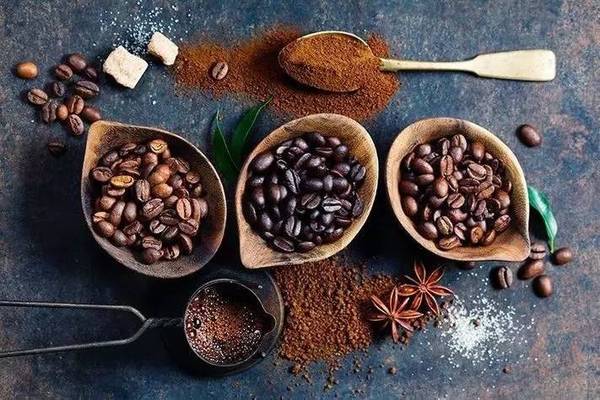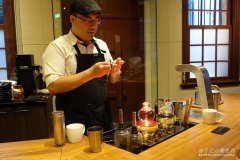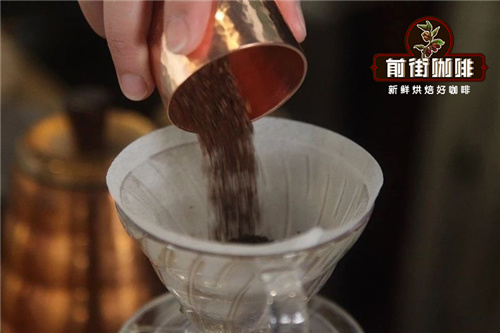Coffee flavor is affected by coffee grinding degree introduction to different coffee brewing methods

Professional coffee knowledge exchange more coffee bean information please follow the coffee workshop (Wechat official account cafe_style)
How to judge and set the grinding degree of espresso
After roasting, the cells of raw beans are destroyed and arranged loosely, but the cell wall is full of carbon dioxide, oil and aromatic flavors produced by pyrolysis, and the bean itself expands as a result, but if the whole cooked bean is not ground, it is not easy to release the aroma and water-soluble flavors stored in the cell wall, and it is difficult to make delicious coffee. So ripe beans need to be ground and crushed to open the hard cell wall, let hot water in, and extract coffee.
1. The thickness is proportional to the extraction time: the thickness of coffee grinding will affect the extraction time and extraction rate. The finer the coffee is ground, it will prolong the extraction time and increase the extraction rate; the thicker the coffee is ground, it will shorten the extraction time and reduce the extraction rate.
two。 Deep baked beans are thicker, shallow roasted beans are thinner: the deeper the roasting degree of coffee, the more fiber is destroyed, the easier to extract, grinding too fine will be too bitter, so it is suitable to grind slightly thicker; the shallower the roasted beans.
3. The fineness of coffee can control bitterness: the finer the coffee is ground, the higher the extraction rate is, the easier it is to extract high molecular weight bitter substances such as chlorogenic acid, quinic acid, caffeine and so on. On the contrary, if you grind it too rough, it will be less difficult to extract astringent bitter substances with high molecular weight, but the sweet taste of middle molecular weight will also be left in the coffee grounds because of insufficient extraction, which is a bit wasteful. Therefore, baristas must pay attention to whether the coffee powder is normal and the suitable thickness of each bean.
However, different coffee brewing methods are suitable for different degrees of grinding, from coarse to fine:
French filter kettle (thickest) > electric trickling filter pot > hand flushing pot, siphon kettle, desktop smart filter cup > mocha pot > espresso > Turkish coffee (finest)
So why is thickness so important? Because it directly affects the extraction rate and the concentration of coffee, different beans have their most suitable thickness. In addition to many experiments, it is suggested that you can refer to the perfect extraction rate range of gold cup theory (18% 22%) and the best concentration (1.15% 1.55%). As long as fine-tuning is made in this range, it will not make the flavor of coffee change too much or cause poor taste spectrum, for beginners. It is also easier to make good coffee, so you might as well be more familiar with the right thickness of each bean when you are free. After all, a difference of 0.5 scale will make its flavor different.
.
Important Notice :
前街咖啡 FrontStreet Coffee has moved to new addredd:
FrontStreet Coffee Address: 315,Donghua East Road,GuangZhou
Tel:020 38364473
- Prev

How much is a cup of siphon coffee at Starbucks? What's so special about the flavor of Starbucks siphon coffee?
Professional coffee knowledge exchange more coffee bean information please follow the coffee workshop (Wechat official account cafe_style) alcohol lamp siphon coffee complete tutorial, home brewing a good cup of siphon coffee siphon Siphon mysterious and hierarchical coffee experience in all Starbucks selected coffee brewing process, siphon can be regarded as the most ornamental, interesting and visual impact
- Next

Comparison of the thickness of coffee within 9 grades compared with the reference for adjusting the grinding thickness of hand-brewed coffee.
Professional coffee knowledge exchange more coffee bean information please pay attention to the coffee workshop (Wechat official account cafe_style) coffee bean grinding fineness how to judge, set the Italian espresso grinding degree below is the name of each part of the bean grinder, of which 9 is the thread adjuster 1. Thread spacing 1.8mm 2. Part 10 scale adjustment cover 17 exactly half circle 3. Compare the above thickness scale with the tooth cutter group
Related
- What is the Philharmonic pressure? How to use Philharmonic pressure to make delicious coffee
- Why does a hand grinder have more fine powder than an electric grinder?
- In addition to the hot mom, what is the difference between the versions of EK43 | ditting and Mahdi ek43?
- What kind of equipment do you need to make coffee by hand? Introduction to novice starter cooking equipment tools
- Espresso needs to be ground how thick and thin scale entry Italian Coffee Machine Bean Grinder investigation and Grinding course
- How much does it cost to open a small private cafe? How much does it cost to learn coffee? How to operate it?
- The difference between the flavor characteristics of hand-brewed coffee and coffee maker is hand-brewed coffee really better than coffee maker? Can I use a coffee machine to make coffee beans by hand?
- The difference between 01 and 02 of hario v60 filter cup what is the difference between 01 and 02 filter cup opening and cooking flavor
- What's the difference between the smart cup and the French kettle? Which is better, the French kettle or the Smart Cup?
- What's the difference between a smart cup and a V60 filter cup? The difference between the taste of smart cup and hand-brewed coffee

